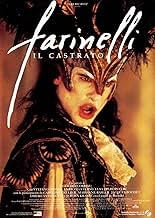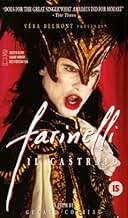AVALIAÇÃO DA IMDb
6,8/10
7,5 mil
SUA AVALIAÇÃO
A história do cantor de ópera Carlo Broschi, que cativou o público europeu do século XVIII com seu nome artístico Farinelli.A história do cantor de ópera Carlo Broschi, que cativou o público europeu do século XVIII com seu nome artístico Farinelli.A história do cantor de ópera Carlo Broschi, que cativou o público europeu do século XVIII com seu nome artístico Farinelli.
- Indicado a 1 Oscar
- 6 vitórias e 4 indicações no total
Enredo
Você sabia?
- CuriosidadesBoth male and female voices were combined to create the sound of Farinelli's singing voice. The male voice was Derek Lee Ragin, a British countertenor and the female Ewa Malas-Godlewska, a Polish mezzo-soprano.
- Erros de gravaçãoLIGHTING. In scenes that show stage lights and chandeliers, the focus on them is softened, but it can still be seen that the "lamps" and "candles" are in fact far too steady, and too smokeless, to be or to contain live flame. Gaslight was not brought into theatres until just after 1800 (in England), and limelight -- with real quicklime -- around 1820. Also, some outdoor lighting -- outside palaces, etc. -- is obviously too bright, blue- or green-shaded, smokeless, and sharp-edged to come from a bonfire.
- Citações
Carlo Broschi: I admire your nerve, madame, in daring to defy Handel.
Countess Mauer: Women are very strong, signor Farinelli. Men's weaknesses make it necessary.
- ConexõesFeatured in The 52nd Annual Golden Globe Awards (1995)
- Trilhas sonorasOmbra fedele anch'io
[Dario's Solo: Act II, Scene XI, from Opera "Idaspe"]
Composed by Riccardo Broschi, Libretto by G.P. Candi and Domenico Lalli (1730, Venice)
Vocals performed by Ewa Malas-Godlewska (Soprano) and Derek Lee Ragin (Countertenor)
Avaliação em destaque
Famed 18th century (castrato) soprano Ferinelli invites a serious biographical study. This 17-18th c. period was, until recent times, skirted over by musicologists and music history teachers.
The result of this omission has been an unsuspecting awareness of the extent to which male performers dominated all forms of period theater, including opera, oratorio, cantata, ballet, and stage plays. "Ferinneli" had an opportunity to provide substantive information in filling this void.
Unfortunately, what resulted is just another Ken Russell-type production (a la "The Music Lovers," "Lisztomania," "Mahler," etc.). In fact, were Andre Corbiau's name not credited as director of "Ferinelli," one would swear this was a Russell composer biopic.
All Russell trademarks are there: excessive closeups of actors in dramatic distress, swirling activity to cover up script weaknesses, and disjointed highlights instead of sequence continuity.
Director-coscriptor Corbiau has Stefano Dionisi as Ferinneli forever falling down and collapsing both on and offstage for no apparent reason, and using the old device of having him hesitate to sing on cue before a full house to superficially create suspense and anxiety.
In fact, Corbiau, like Russell, is more intent on affecting than expressing: manipulating the viewer than sincerely sharing. As a result, one is held a arm's length of emotional participation throughout.
While no contemporary production can create a truly authentic period setting, there are questions which arise here: George Frederick Handel, one of the world's most prolific and fine composers, is reduced to that of a mere rival theatrical impressario; and Farinelli is forever acting oddly--claiming vocal loss, serious indisposition, and tripping out on opium. Indeed, at times this seems more like a baroque version of sex-drugs-and-rock-'n'roll.
On the brighter side, the staging of the operatic scenes are wonderfully on-target, having been obviously well-researched and meticulously designed. The combination real-and-computer-created vocal work is fascinating in its etherial timbre and in its negotiation of Handelean melismas, embellishments and assorted ornamentation. Likewise, the baroque pit orchestra and period opera house decor is strikingly detailed.
What a pity "Farinelli" fails in its main opportunity: to convey a simple, heart-felt story of one of history's most celebrated singers.
The result of this omission has been an unsuspecting awareness of the extent to which male performers dominated all forms of period theater, including opera, oratorio, cantata, ballet, and stage plays. "Ferinneli" had an opportunity to provide substantive information in filling this void.
Unfortunately, what resulted is just another Ken Russell-type production (a la "The Music Lovers," "Lisztomania," "Mahler," etc.). In fact, were Andre Corbiau's name not credited as director of "Ferinelli," one would swear this was a Russell composer biopic.
All Russell trademarks are there: excessive closeups of actors in dramatic distress, swirling activity to cover up script weaknesses, and disjointed highlights instead of sequence continuity.
Director-coscriptor Corbiau has Stefano Dionisi as Ferinneli forever falling down and collapsing both on and offstage for no apparent reason, and using the old device of having him hesitate to sing on cue before a full house to superficially create suspense and anxiety.
In fact, Corbiau, like Russell, is more intent on affecting than expressing: manipulating the viewer than sincerely sharing. As a result, one is held a arm's length of emotional participation throughout.
While no contemporary production can create a truly authentic period setting, there are questions which arise here: George Frederick Handel, one of the world's most prolific and fine composers, is reduced to that of a mere rival theatrical impressario; and Farinelli is forever acting oddly--claiming vocal loss, serious indisposition, and tripping out on opium. Indeed, at times this seems more like a baroque version of sex-drugs-and-rock-'n'roll.
On the brighter side, the staging of the operatic scenes are wonderfully on-target, having been obviously well-researched and meticulously designed. The combination real-and-computer-created vocal work is fascinating in its etherial timbre and in its negotiation of Handelean melismas, embellishments and assorted ornamentation. Likewise, the baroque pit orchestra and period opera house decor is strikingly detailed.
What a pity "Farinelli" fails in its main opportunity: to convey a simple, heart-felt story of one of history's most celebrated singers.
- harry-76
- 31 de mai. de 2001
- Link permanente
Principais escolhas
Faça login para avaliar e ver a lista de recomendações personalizadas
- How long is Farinelli?Fornecido pela Alexa
Detalhes
- Data de lançamento
- Países de origem
- Central de atendimento oficial
- Idiomas
- Também conhecido como
- 絕代艷姬
- Locações de filme
- Empresas de produção
- Consulte mais créditos da empresa na IMDbPro
Bilheteria
- Faturamento bruto nos EUA e Canadá
- US$ 1.573.411
- Faturamento bruto mundial
- US$ 1.600.226
Contribua para esta página
Sugerir uma alteração ou adicionar conteúdo ausente

































